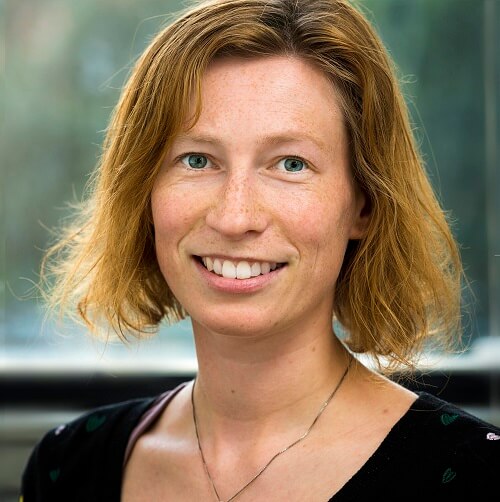This award is intended for outstanding members of the SMBE community who are in the early stages of an independent research career (3-7 years post-Ph.D.). The primary signal of research excellence is a trajectory of innovative, creative research that is moving the field of Molecular Biology and Evolution forward. The ideal candidate will be one whose career embodies the values of the society, for example in mentoring, outreach, and teaching. The prize includes recognition at the annual SMBE banquet, a cash prize of $1000 and a travel award ($2000 for intracontinental travel/$3000 for intercontinental travel) to attend the annual meeting. This award will be given annually. The deadline to apply for 2026 Faculty Awards is February 20, 2026.
Current members of council are ineligible for the early/mid/senior/service awards until one year post-Council.
2025 SMBE Early-Career Excellence Award Winner: Alison Feder

Alison Feder is an Assistant Professor of Genome Sciences at the University of Washington, and an Affiliate Investigator of the Herbold Computational Biology Program at the Fred Hutchinson Cancer Center. The Feder lab studies the rapid evolutionary processes undertaken by the viruses, bacteria and cancerous cells that live within us and cause disease. She earned her B.A. in Mathematics from the University of Pennsylvania, an M.Sc. in Statistics from the University of Oxford and a Ph.D. in Biology from Stanford working with Dmitri Petrov, before becoming a Miller Fellow at UC Berkeley with Oskar Hallatschek. The Feder Lab is currently supported by an NIH Director’s New Innovator Award and grants from the Cystic Fibrosis Foundation.
2024 SMBE Early-Career Excellence Award Winner: Parul Johri

Parul Johri is an Assistant Professor in the Department of Biology and the Department of Genetics at the University of North Carolina, Chapel Hill. The Johri Lab focuses on how non-adaptive evolutionary processes, including selection against deleterious mutations, population history, and genome architecture, act to jointly shape genomic variation. Research in the lab involves a combination of computational and theoretical approaches, statistical method development, and analyses of sequence variation data from natural populations. Parul received her Bachelor’s in Mathematics from Delhi, and a Master's in Biology from the Tata Institute of Fundamental Research in Mumbai, India. She earned her PhD in the Evolution, Ecology, and Behavior program at Indiana University, Bloomington, under the supervision of Michael Lynch in 2018, and completed her postdoctoral work with Jeffrey Jensen at Arizona State University (2018-2022). Parul started her lab at UNC in 2023.
2023 SMBE Early-Career Excellence Award Winner: Amy Goldberg

Amy is an Assistant Professor at Duke University. The Goldberg lab studies the population genetics of humans, our primate relatives, and our parasites. Current work combines computational methods development with field work to study genetic adaptation on historically- and ecologically-relevant timescales. Before starting her lab in 2019, she was a Miller Fellow at UC Berkeley working with Rasmus Nielsen. She completed her PhD with Noah Rosenberg at Stanford in 2017, and her Bachelor's in Mathematics and Evolutionary Anthropology at the University of Michigan (2012). The Goldberg lab is currently supported by NIH NIGMS R35 MIRA and NIAID R01 grants, and an NSF SBE grant.
2022 SMBE Early-Career Excellence Award Winner: Molly Schumer

Molly Schumer completed her undergraduate degree in Biology at Reed College in 2009. She received her PhD from Princeton in Ecology & Evolutionary Biology in 2016 working with Dr. Peter Andolfatto and was co-advised by Dr. Gil Rosenthal. She completed her postdoctoral work with Dr. Molly Przeworski at Columbia University and Dr. David Reich at Harvard Medical School where she was a Junior Fellow and Hanna H Gray Fellow (2016-2019). She began her lab at Stanford in fall of 2019. Research in her lab focuses on the genetic and evolutionary consequences of hybridization and the genetic architecture of phenotypic differences between species.
2021 SMBE Early-Career Excellence Award Winner: Kelley Harris

Kelley Harris is an Assistant Professor in the Department of Genome Sciences at the University of Washington School of Medicine, as well as an Affiliate Assistant Member of the Herbold Computational Biology Program at the Fred Hutchinson Cancer Research Center. Her group is trying to understand how mutational processes are shaped by genetic drift and natural selection and how this evolutionary process in turn modulates the accumulation of genetic variation. After earning a B.A. in Mathematics from Harvard and an M.Phil. in Biological Sciences from Cambridge, advised by Richard Durbin, she completed her Ph.D. at UC Berkeley working with Rasmus Nielsen and Yun Song. Her postdoctoral work at Stanford in the lab of Jonathan Pritchard was supported by an NIH NRSA postdoctoral fellowship. The Harris Lab is currently supported by an NIH NIGMS R35 grant as well as grants from the Burroughs Wellcome Fund, the Sloan Foundation, the Kinship Foundation, and the Pew Charitable Trusts.

Iain Mathieson is an Assistant Professor in the Department of Genetics at the Perelman School of Medicine, University of Pennsylvania. His group studies the genetic architecture and evolution of complex traits in humans, with a particular focus on using ancient DNA to provide a direct window onto human history and evolution. He received a B.A. in Mathematics and an M.Phil. in Statistical Science from the University of Cambridge, and a D.Phil. in Genomic Medicine & Statistics from the University of Oxford advised by Gil McVean and Cecilia Lindgren and supported by the Wellcome Trust. He then completed a postdoc at Harvard Medical School with David Reich, supported by a fellowship from the Human Frontier Science Program. His lab is currently supported by a NIH NIGMS R35 Maximizing Investigators’ Research Award, a grant from the Charles E. Kaufman foundation and a Sloan Foundation research fellowship.
2019 SMBE Allan Wilson Junior Award for Independent Research Winner: Claudia Bank

Dr. Claudia Bank heads the Evolutionary Dynamics group at the Gulbenkian Science Institute in Oeiras, Portugal. Her group studies the population genetics of adaptation and speciation using a combination of mathematical modeling, statistical method development and data analysis, and experimental evolution. After an undergraduate degree in Mathematics from the University of Bielefeld, Germany, Dr. Bank earned her PhD in Population Genetics from the University of Veterinary Medicine in Vienna, Austria, supervised by Joachim Hermisson, followed by a postdoc with Jeffrey Jensen at the Ecole Polytechnique Fédérale de Lausanne in Switzerland. During her PhD and postdoc, she undertook two research stays in the group of Mark Kirkpatrick at UT Austin, and at the Simons Institute for the Theory of Computing at UC Berkeley. Dr. Bank is currently supported by grants from the Portuguese Science Foundation, the European Research Council, and the European Molecular Biology Organization to expand her studies of fitness landscapes across environments and biological levels of organization.
2018 SMBE Allan Wilson Junior Award for Independent Research Winner: Melissa Wilson Sayres, Arizona State University

Dr. Melissa Wilson Sayres is an Assistant Professor in the School of Life Sciences and Center for Evolution and Medicine at Arizona State University. Broadly, her laboratory analyzes large-scale genomic and transcriptomic datasets to study sex-specific processes. The Wilson Sayres laboratory studies how sex chromosomes arise and evolve, utilizes sex chromosomes to understand population history, and is working to incorporate genetic and phenotypic sex as a biological variable in health and disease research. She received her B.S. in Medical Mathematics from Creighton University in Omaha, Nebraska, her Ph.D. in Integrative Biology: Bioinformatics & Genomics from The Pennsylvania State University working with Dr. Kateryna Makova, and studied as a Miller postdoctoral fellow at the University of California, Berkeley with Rasmus Nielsen. Her laboratory and research are currently supported by an NIH NIGMS R35 Maximizing Investigators’ Research Award, the Leakey Foundation, and a Heritage grant from Arizona Game and Fish.
2017 SMBE Allan Wilson Junior Award for Independent Research Winner: Mia Levine, University of Pennsylvania

Dr. Mia Levine is an Assistant Professor in the Department of Biology and the Epigenetics Institute at the University of Pennsylvania. The Levine Lab investigates how intra-genomic conflict shapes the evolution of DNA packaging proteins. Together with her trainees, Mia combines evolutionary genetics with transgenics, genomics, and cell biology to identify selfish genetic elements that drive host protein adaptation and to uncover the functional consequences for chromosome integrity and transmission. Mia graduated magna cum laude with a BA in Biology from the University of Pennsylvania, where she is now faculty. She earned an MSc in Ecology from the University of Illinois, Urbana-Champaign under Dr. Ken Paige and an NSF GRFP-supported PhD in population genetics from the Center of Population Biology at the University of California, Davis under Dr. David Begun. Mia joined the Fred Hutchinson Cancer Research Center to work with Dr. Harmit Malik as a postdoctoral fellow supported by an NIH NIGMS Ruth L. Kirschstein NRSA and an NIH NIGMS K99 Pathway to Independence Award. Mia is currently a Forbeck Foundation Scholar and recipient of an NIH NIGMS R35 Maximizing Investigators’ Research Award.
2016 SMBE Allan Wilson Junior Award for Independent Research Winner: Joanna Kelley, Washington State University

Dr. Joanna Kelley is an Assistant Professor in the School of Biological Sciences at Washington State University. She runs an evolutionary genomics laboratory that focuses on high-throughput genome sequencing and computational approaches to analyzing big data in genomics. Her research focuses on understanding the genomic basis for adaptation to extreme environments. She received her B.A. in mathematics and biology with honors from Brown University, working with Johanna Schmitt. She earned her Ph.D. in Genome Sciences from the University of Washington under Willie Swanson. As a postdoctoral researcher at the University of Chicago in Human Genetics with Molly Przeworski, she received a National Institutes of Health Ruth L. Kirschstein National Research Service Award. Dr. Kelley was also a postdoctoral researcher in the Department of Genetics at Stanford University with Carlos Bustamante.
